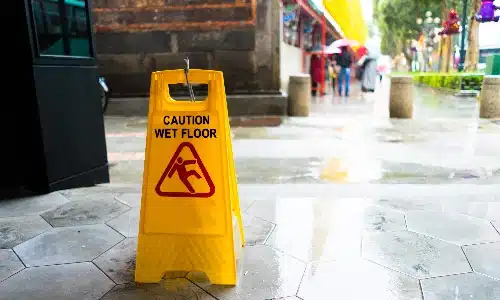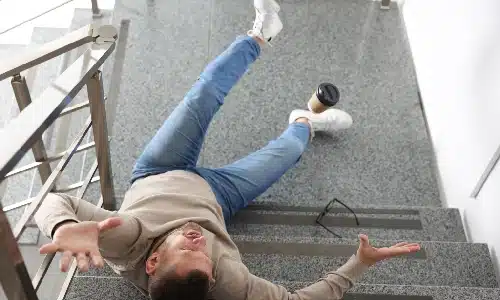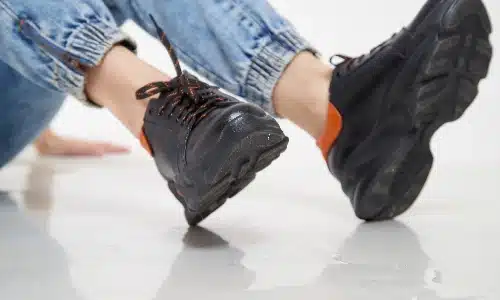Tampa Premises Liability Lawyer
Imagine slipping on a wet floor at a Tampa grocery store like Publix or tripping over cracked pavement at an apartment complex near Ybor City. Suddenly, you’re facing mounting medical bills, missed work, and pain that disrupts your life.

Who’s responsible? In many cases, the property owner’s negligence is to blame—and a Tampa premises liability lawyer can help you fight for the compensation you deserve.
At Darrigo & Diaz Attorneys at Law, we’re dedicated to holding negligent parties accountable. Contact us today for a free consultation and take the first step toward recovery.
Why You Need a Tampa Premises Liability Attorney
Proving negligence isn’t easy. Property owners and their insurers often deny responsibility, and gathering evidence—like security footage from a store or witness statements—can be tricky without legal support.
A Tampa premises liability attorney brings local expertise and understanding of Florida statutes and property codes to strengthen your case.
At Darrigo & Diaz Attorneys at Law, we work on a contingency basis: no fees unless we win your case. With over 20 years fighting for residents and $10 million recovered for clients, we’re here to level the playing field against big insurers and negligent owners.
Here’s how we can assist:
- Free Case Evaluation: We assess your claim’s strength at no cost.
- Thorough Investigation: We obtain Tampa property records, surveillance, and expert testimony.
- Aggressive Advocacy: We negotiate with insurers or take your case to court if needed.
What sets us apart? We visit accident sites across Tampa Bay—from St. Pete to Hyde Park—to build airtight cases.
Our track record speaks for itself: $1.2 million won for a Tampa slip-and-fall victim injured at a local retailer. Let us fight for you.
Premises Liability Explained by a Florida Premises Liability Lawyer
Premises liability refers to a property owner’s legal duty to keep their premises safe for visitors. If they fail to fix hazards—like a spilled drink in a mall or broken stairs in a downtown office building—and you get hurt, they could be liable for your injuries.

In Florida, this responsibility depends on your status as a visitor: an invitee (like a shopper), a licensee (a social guest), or even a trespasser.
From slip and falls at WestShore Plaza to assaults in poorly lit parking lots, premises liability covers a range of incidents tied to negligence. A Tampa premises liability lawyer can evaluate your case and guide you through Florida’s laws to seek justice.
Common Cases Our Florida Premises Liability Attorneys Handle
Tampa’s bustling streets and businesses see their share of accidents. Here are some common premises liability cases we handle:
- Slip and Falls: Wet floors at malls or uneven sidewalks in Channelside can lead to serious injuries.
- Negligent Security: Assaults in dimly lit parking garages or apartment complexes due to inadequate lighting or guards.
- Elevator/Escalator Malfunctions: Faulty equipment in office towers causing falls or entrapments.
- Dog Bites: Attacks on private property, a growing concern in neighborhoods.
Tampa Bay reports hundreds of slip-and-fall injuries yearly, many in retail and residential settings. If you’ve been hurt, a skilled slip and fall lawyer can help you build a strong claim.
Compensation in a Premises Liability Case
When you’re injured on someone else’s property due to their negligence, a successful premises liability claim can provide significant financial relief by covering a wide range of damages. While many people focus on obvious costs like medical bills or missed work, the compensation you may be entitled to in a premises liability case is often much broader—and potentially much larger—than you might realize.
At Darrigo & Diaz, we’re committed to ensuring you recover every dollar you deserve. Below, we’ve expanded the discussion to give you a comprehensive look at the types of compensation available and how we fight to maximize your recovery.
Medical Expenses
Medical costs are typically the first concern after an injury, but they encompass far more than just an initial hospital visit. In a premises liability case, you can seek compensation for the full scope of your medical care, including:
- Immediate Care
- Ongoing Treatment
- Medications and Supplies
- Rehabilitation
- Assistive Devices
- Future Medical Needs
Lost Wages and Diminished Earning Capacity
An injury doesn’t just affect your health—it can disrupt your ability to earn a living. Compensation for lost wages goes beyond the paychecks you miss right after the incident and considers your long-term financial stability:
- Immediate Lost Wages
- Diminished Earning Capacity
- Vocational Retraining
For instance, a delivery driver injured in a fall at an apartment complex might not be able to lift packages anymore. We’d work with vocational experts to assess how this impacts their earning potential and fight for compensation that reflects both their immediate losses and future financial setbacks.
Pain and Suffering
Some of the most profound effects of an injury aren’t financial—they’re physical and emotional. Pain and suffering compensation addresses these intangible losses, which can include:
- Physical Pain
- Emotional Distress
- Loss of Enjoyment of Life
In Florida, there’s no set formula for calculating pain and suffering, but two common approaches are:
- Multiplier Method: Your economic damages (e.g., medical bills and lost wages) are multiplied by a number (typically 1.5 to 5) based on the severity of your injury.
- Per Diem Approach: A daily rate is assigned to your suffering, multiplied by the number of days you’ve been affected.
For example, if a fall leaves you unable to enjoy beaches or play with your kids, that loss carries real value. We ensure your settlement reflects the full extent of these personal damages.
Steps to Take After a Premises Liability Injury

If you’ve been injured on someone else’s property—whether it’s a slip on a wet floor at a local store or a fall due to a broken stair at an apartment complex—acting quickly is essential to protect your health and your legal rights. The moments after an injury can feel chaotic and overwhelming, but taking the right steps can make a significant difference in your recovery and any potential premises liability claim.
Here’s an expanded guide on what to do:
Seek Medical Attention Immediately
Your well-being comes first. Even if your injury seems minor—like a slight limp or a small cut—it could develop into something more serious without prompt care.
Beyond health, seeing a doctor right away creates a medical record that ties your injury to the incident, which is vital evidence if you pursue a claim. Visit a facility like Tampa General Hospital, St. Joseph’s Hospital, or a nearby urgent care clinic.
For severe injuries, don’t hesitate to call 911 for emergency help. Explain your symptoms and the incident in detail to the healthcare provider, and be sure to request copies of all medical reports and bills—these documents will be key for your lawyer later.
Document the Scene Thoroughly
Evidence can vanish fast. A spill might be mopped up, a broken step repaired, or security footage erased.
Capturing the scene as it was when you got hurt can strengthen your case significantly.
- Take clear photos or videos of the specific hazard (e.g., a spilled drink, cracked pavement, or a missing handrail).
- Capture the surrounding area to show the context—like dim lighting or absent warning signs.
- If you can, photograph any visible injuries (bruises, cuts, etc.) right away.
If you’re too injured to do this yourself, ask a friend, family member, or even a witness to help. The more details you preserve, the better.
Report the Incident to the Property Owner or Manager
Reporting the injury creates an official record and alerts the property owner to the issue. This documentation can be critical evidence later.
- Inform the property owner, manager, or an employee as soon as possible.
- Stick to the facts—say something like, “I tripped over a loose tile near the entrance,” without guessing who’s at fault.
- Ask for a written incident report and request a copy for your records. If they won’t provide one, jot down the name of the person you spoke to and what was discussed.
Don’t minimize your injury or say you’re “okay.” Keep it factual and let your lawyer guide further discussions.
Avoid Insurance Traps—Don’t Give Statements Without Legal Advice
Insurance adjusters might reach out shortly after the incident, often before you’ve consulted a lawyer. Their job is to protect the company’s bottom line, not your interests. They may ask tricky questions or push for a recorded statement that could be twisted to weaken your claim.
- Politely refuse to talk or sign anything until you’ve spoken to a lawyer. You can say, “I’m still recovering and will have my attorney follow up.”
- Don’t speculate about fault or downplay your injuries—it could hurt your case later.
A lawyer can shield you from these tactics and ensure your words aren’t used against you.
Contact a Tampa Premises Liability Attorney
- Immediate Support: A lawyer can advise you on how to handle insurance companies and avoid early missteps.
- Evidence Collection: They can secure critical evidence—like witness statements or security footage—before it’s lost.
- Stress Relief: With a professional managing the legal side, you can focus on healing.
Tampa premises liability lawyers from Darrigo & Diaz Attorneys at Law offer free consultations and work on a contingency basis—you don’t pay unless we win.
Florida’s Pure Comparative Negligence Rule
Florida uses a pure comparative negligence system, which affects premises liability cases. Under this rule, you can still recover damages even if you were partly at fault, but your compensation will be reduced by your percentage of responsibility.
For example, if you’re awarded $100,000 but found 30% at fault (e.g., for not watching where you were going), you’d receive $70,000. This applies no matter how much fault you share, as long as it’s less than 100%.
What Is the Statute of Limitations for Premises Liability in Florida?
In Florida, the statute of limitations for premises liability actions is four years from the date of the incident. This means you have four years from the day you were injured to file a lawsuit against the property owner or responsible party.
If you miss this deadline, you may lose your chance to pursue compensation, regardless of the strength of your case. Note that certain circumstances can extend or modify this four-year window:
- Minors: If the injured person is under 18 at the time of the incident, the statute of limitations doesn’t begin until their 18th birthday. This gives them until their 22nd birthday to file a lawsuit.
- Delayed Discovery: If the injury or its cause isn’t immediately obvious—such as symptoms from toxic exposure that appear years later—the clock may start when the injury was discovered or reasonably should have been discovered.
- Government Property: If the injury occurred on government-owned property (e.g., a public sidewalk or building), stricter rules apply. You might need to file a notice of claim within a much shorter period, sometimes as little as six months.
These exceptions can complicate deadlines, so it’s wise to consult a Tampa personal injury attorney to confirm the timeline for your specific case.
How Our Tampa Premises Liability Law Firm Can Help
At Darrigo & Diaz Attorneys at Law, we take the burden off your shoulders. We assess your claim’s strength at no cost, and we negotiate with insurers or take your case to court if needed.
Our track record speaks for itself: $1.2 million won for a Tampa slip-and-fall victim injured at a local retailer. Let us fight for you when you contact us at (813) 774-3341 for a free case evaluation.
Tampa Premises Liability FAQ
How do I choose a Tampa, FL personal injury lawyer specializing in premises liability cases?
Selecting the right lawyer can make or break your premises liability case. Here’s what to consider:
- Local Experience: Choose a lawyer familiar with local courts and Florida’s premises liability laws. Local expertise helps them navigate city-specific legal nuances effectively.
- Specialization: Look for someone with a strong background in premises liability cases—like slip and falls, negligent security, or unsafe property conditions—rather than a general personal injury attorney.
- Track Record: Ask about their success rate with similar cases. A lawyer who has won settlements or verdicts premises liability claims is a good sign of their capability.
- Reputation: Check online reviews and testimonials from past clients to gauge their reliability and client service.
- Communication: Pick a premises liability attorney who explains things clearly and keeps you in the loop. Premises liability cases can get complicated, so you need someone who makes the process easy to understand.
A great Tampa premises liability lawyer will offer a free consultation to discuss your case and work on a contingency fee basis—meaning you pay nothing unless they win.
How long does it take to settle a premises liability case in Tampa?
There’s no one-size-fits-all answer—settlement timelines depend on your case’s details. Here’s what affects the duration:
- Case Complexity: Simple cases with clear evidence (e.g., a documented spill in a grocery store) might settle in 3 to 6 months via negotiation.
- Injury Severity: Severe injuries often take longer because they require extensive medical records and proof of long-term impact.
- Negotiation: If the property owner’s insurance company offers a fair deal quickly, resolution can be swift. If they dispute liability or lowball you, it could stretch to a year or more, especially if the case goes to trial.
- Court Schedules: The court system can add delays if litigation is necessary.
On average, expect 6 to 18 months, but your premises liability lawyer can give you a better estimate based on your situation. Rushing might mean less compensation, so patience can pay off.
What is the premises liability law in Florida?
The state’s premises liability law requires property owners to keep their premises safe and warn visitors about dangers. Here’s the breakdown:
- Duty of Care: The responsibility varies by visitor type:
- Invitees (e.g., shoppers at a mall) get the highest protection—owners must inspect and fix hazards or warn about them.
- Licensees (e.g., guests at a friend’s house) are owed warnings about known risks.
- Trespassers get minimal protection, but owners can’t intentionally harm them.
- Comparative Negligence: If you’re partly at fault (e.g., you tripped while distracted), your compensation drops by your share of blame. As long as you’re less than 50% responsible, you can still recover damages.
- Time Limit: You have four years from the injury date to file a claim.
These laws apply to everything from wet floors in stores to poorly lit parking lots. A skilled premises liability lawyer can help you prove the owner failed in their duty.
What is the difference between liability and negligence?
These terms are related but distinct:
- Liability: This is legal responsibility for harm or damage. In premises liability, it means the property owner must compensate you for injuries caused by unsafe conditions.
- Negligence: This is a specific reason for liability—when someone doesn’t act with reasonable care, causing harm. For example, if a property owner ignores a broken handrail they knew about, that’s negligence.
To win a premises liability case, you often need to prove negligence by showing:
- The owner owed you a duty of care.
- They breached it (e.g., didn’t fix a hazard).
- That breach caused your injury.
- You suffered real losses (like medical bills).
Knowing the difference helps clarify what you’re fighting for in your claim.
